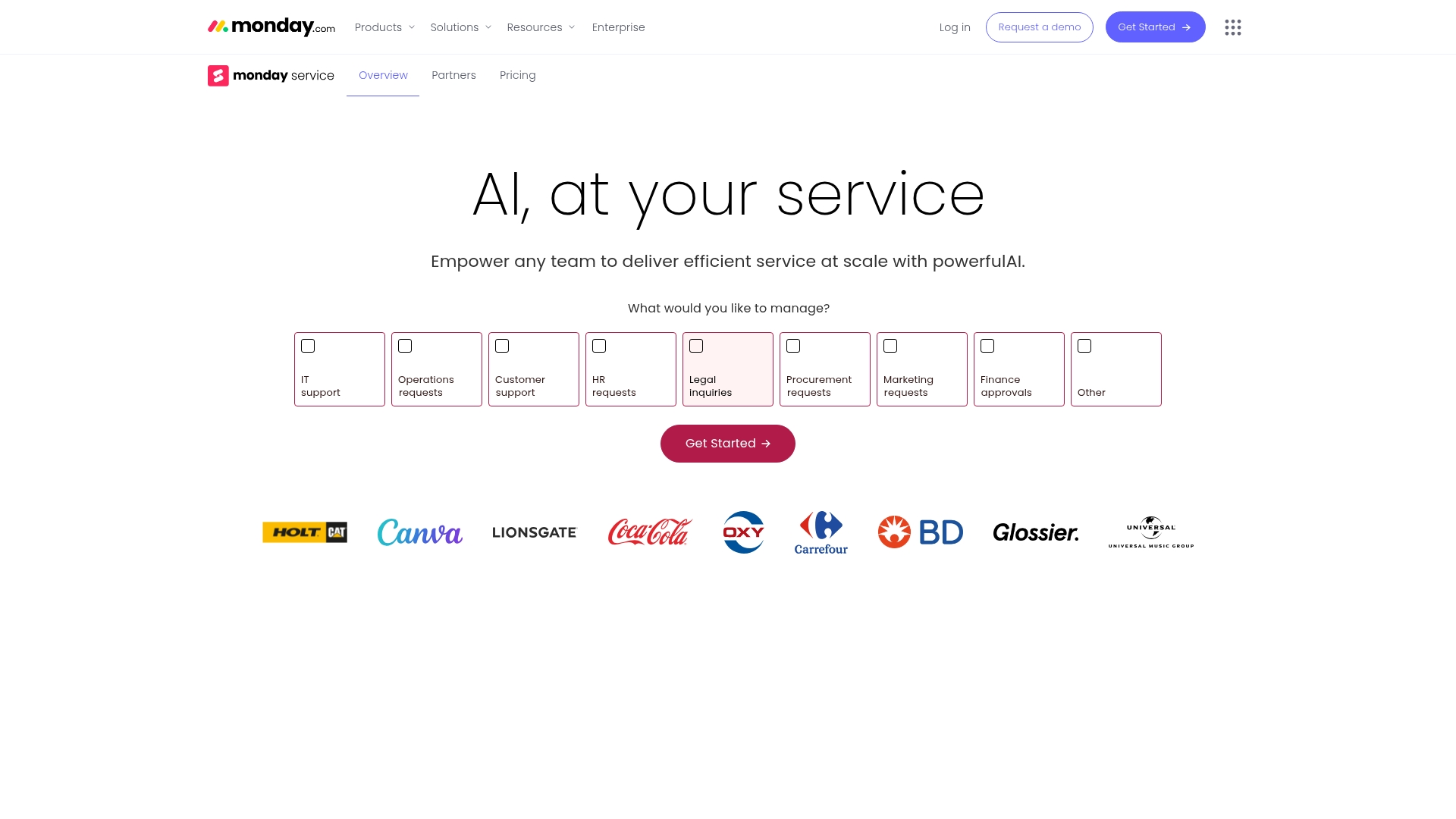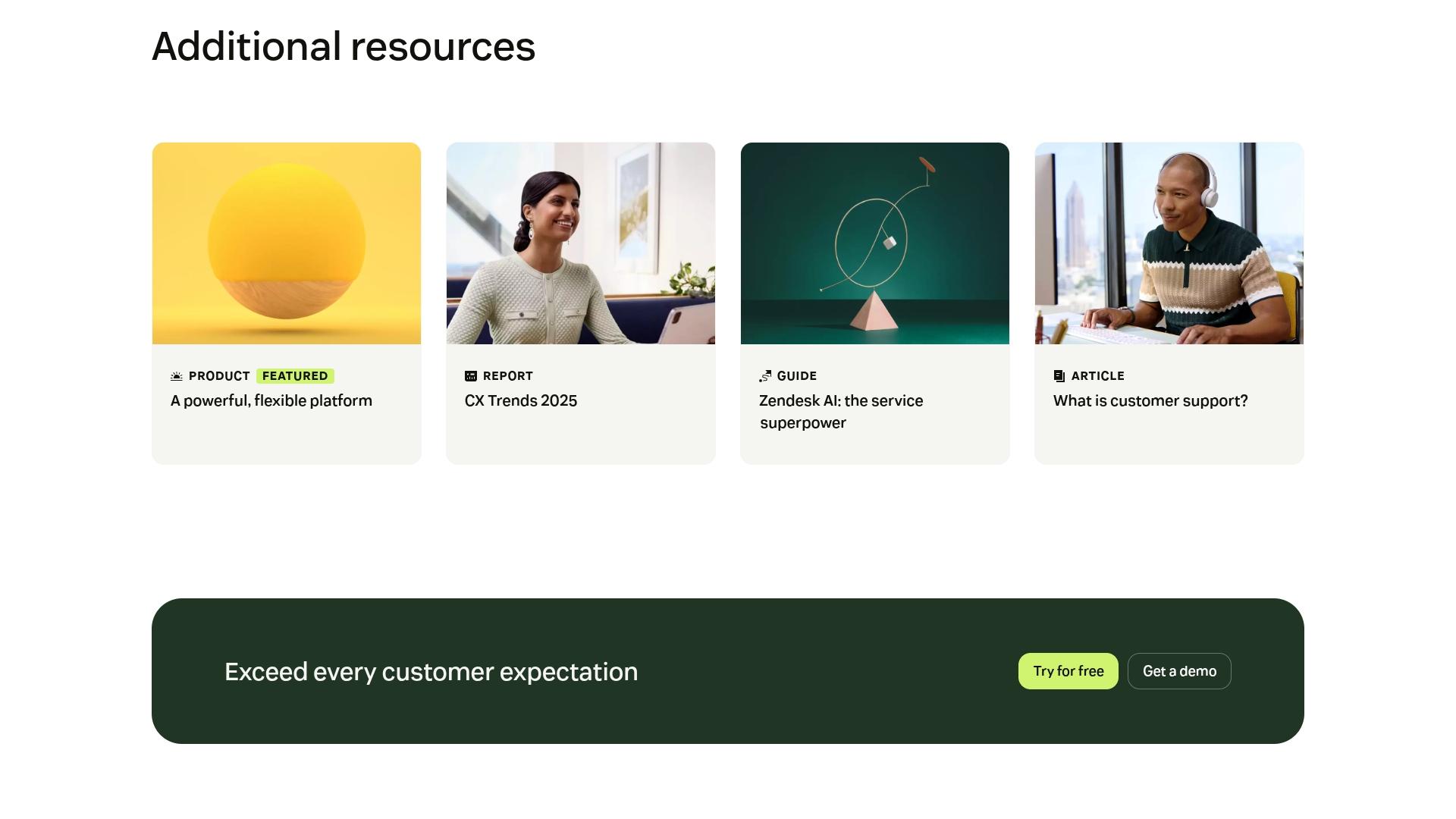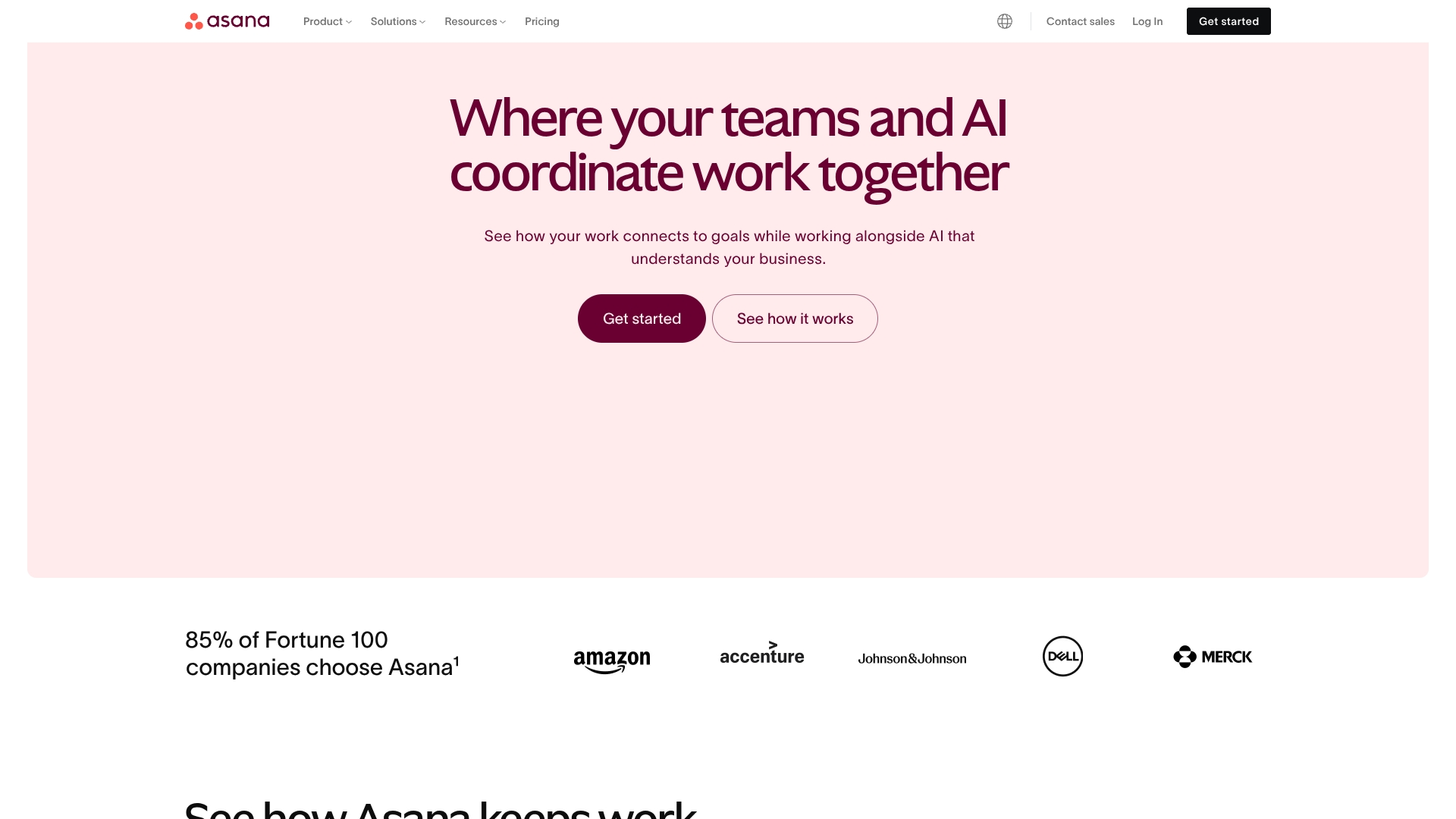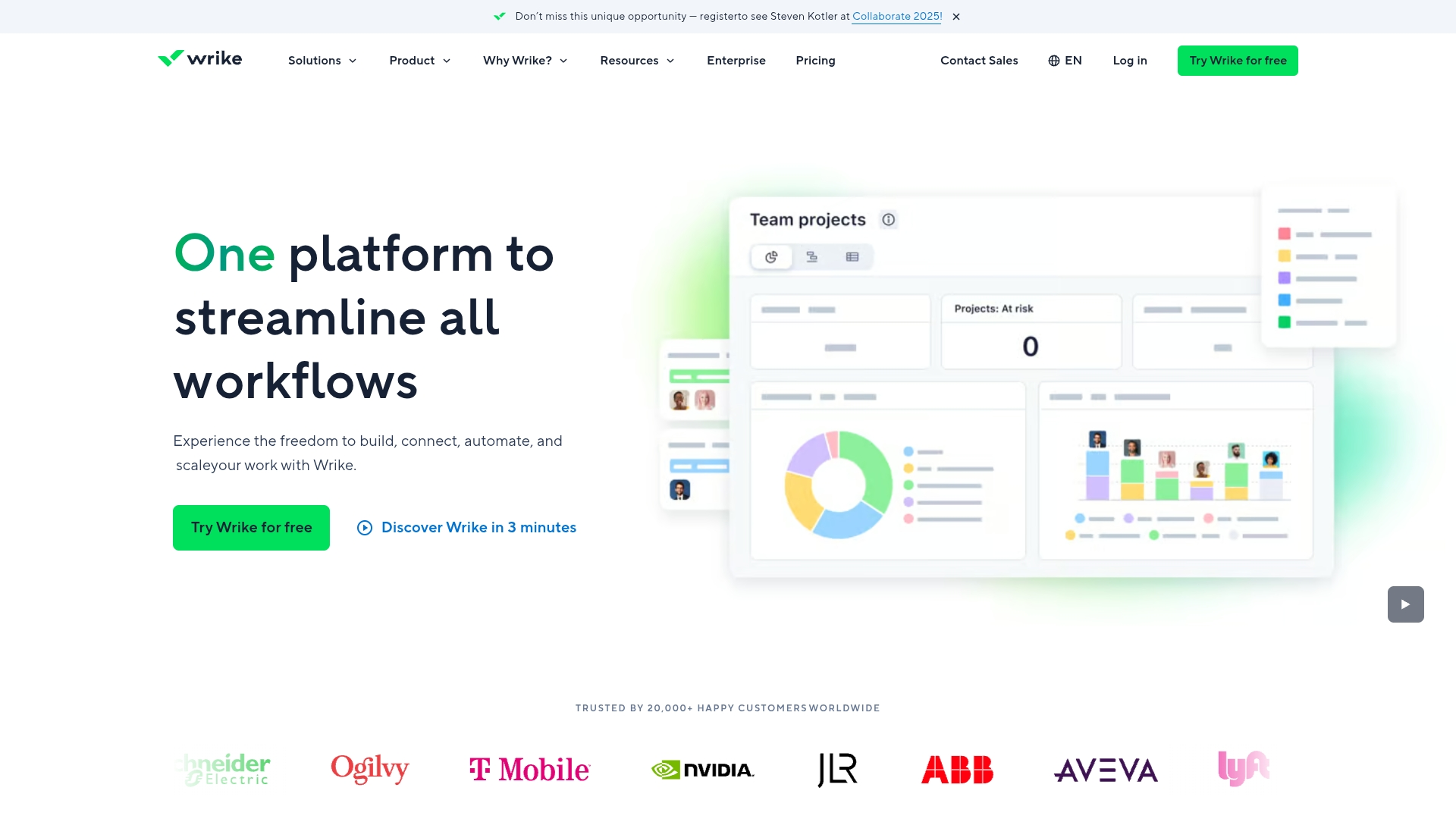IT service teams are under more pressure than ever. Complex requests come from every direction, and users expect instant solutions. That’s why many organizations are turning to leading IT service companies with AI capabilities: to shift from reactive firefighting to proactive problem-solving through automation and intelligent insights.
The key is finding a platform that makes this power accessible, with an intuitive design that helps your team adopt new workflows naturally. This guide explores the top platforms on the market, breaks down the essential AI features that drive success, and offers a clear framework for selecting the right partner for your team.
Try monday serviceWhy IT service needs AI now
Your IT team is drowning in tickets. The traditional IT service management playbook can’t keep up with today’s demands. Service requests bounce between multiple departments, users expect instant support, and you’re stuck trying to deliver white-glove service at enterprise scale.
AI changes everything here: it automatically routes tickets to the right people, handles routine tasks like sorting and status updates, and gives your team space to focus on work that actually moves the needle. You’re giving them the tools to win.
But we’re just getting started. AI in IT service is evolving fast, shifting from basic automation to proactive issue resolution. We’re moving into an era where AI resolves issues before they’re even reported, handling complex, multi-step requests autonomously while your team focuses on strategic work that drives the business forward. This is how you shift from keeping the lights on to lighting the way ahead.
Getting started is easier than you think. monday Service puts these powerful AI tools directly into your hands with an intuitive design, empowering your team to deliver smarter, faster, and more personalized service from day one.
Try monday serviceLeading providers in AI-powered IT service
The market is flooded with platforms adding AI to their service offerings, but a powerful feature is useless if your team finds it inaccessible. The true differentiator is a platform where AI feels like a natural extension of the workflow, helping everyone work smarter right out of the box.
The best providers stand out by delivering sophisticated intelligence with zero complexity. We build tools with the belief that powerful AI shouldn’t require a data science degree to manage; it should feel intuitive.
You achieve success when AI becomes less of a black box and more of a trusted teammate, enhancing your team’s expertise instead of trying to replace it. Together, we can use these built-in smarts to resolve issues faster, spot trends, and keep operations running beautifully smooth.
1. Monday service
With a focus on connecting ticketing, projects, and cross-departmental collaboration, monday service uses AI-powered automation to create a unified service management platform. The platform specializes in intelligent workflow customization and real-time analytics, making it ideal for organizations that need flexible service operations across IT, HR, facilities, and other departments.
Example:
Monday service empowers organizations to streamline service delivery across all departments with AI-driven automation and customizable workflows that adapt to any team’s specific needs.
Key features:
- AI-powered ticket triage: Automatically categorizes requests by type, urgency, and sentiment while routing them to the right agents.
- No-code workflow builder: Lets teams create custom service processes with drag-and-drop automation for replies, notifications, and approvals.
- Unified platform: Connects service requests with project execution, asset management, and knowledge bases for complete operational visibility.
Pricing:
- Free: $0 forever for up to 2 seats with 3 boards and basic features
- Basic: $9 per seat/month (minimum 3 seats, billed annually) with unlimited items and 5GB storage
- Standard: $12 per seat/month with timeline views, guest access, and 250 automations per month
- Pro: $19 per seat/month with private boards, time tracking, and 25,000 automations per month
- Enterprise: Custom pricing with advanced security, 250,000 automations, and 24/7 priority support
Yearly plans save 18% compared to monthly billing.
Why it stands out:
- Built-in AI service agent resolves requests instantly using ticket history and knowledge base for personalized solutions
- Seamless integration with the monday.com Work OS allows service tickets to transform into projects without switching platforms
- Real-time dashboards provide executive-level visibility into service performance trends and SLA adherence across all departments
2. ServiceNow
ServiceNow’s AI-powered platform is engineered for enterprise-scale IT operations, unifying service management across vast organizational structures. The platform specializes in predictive intelligence and enterprise-grade automation, making it the go-to choice for Fortune 500 companies managing complex IT infrastructures.
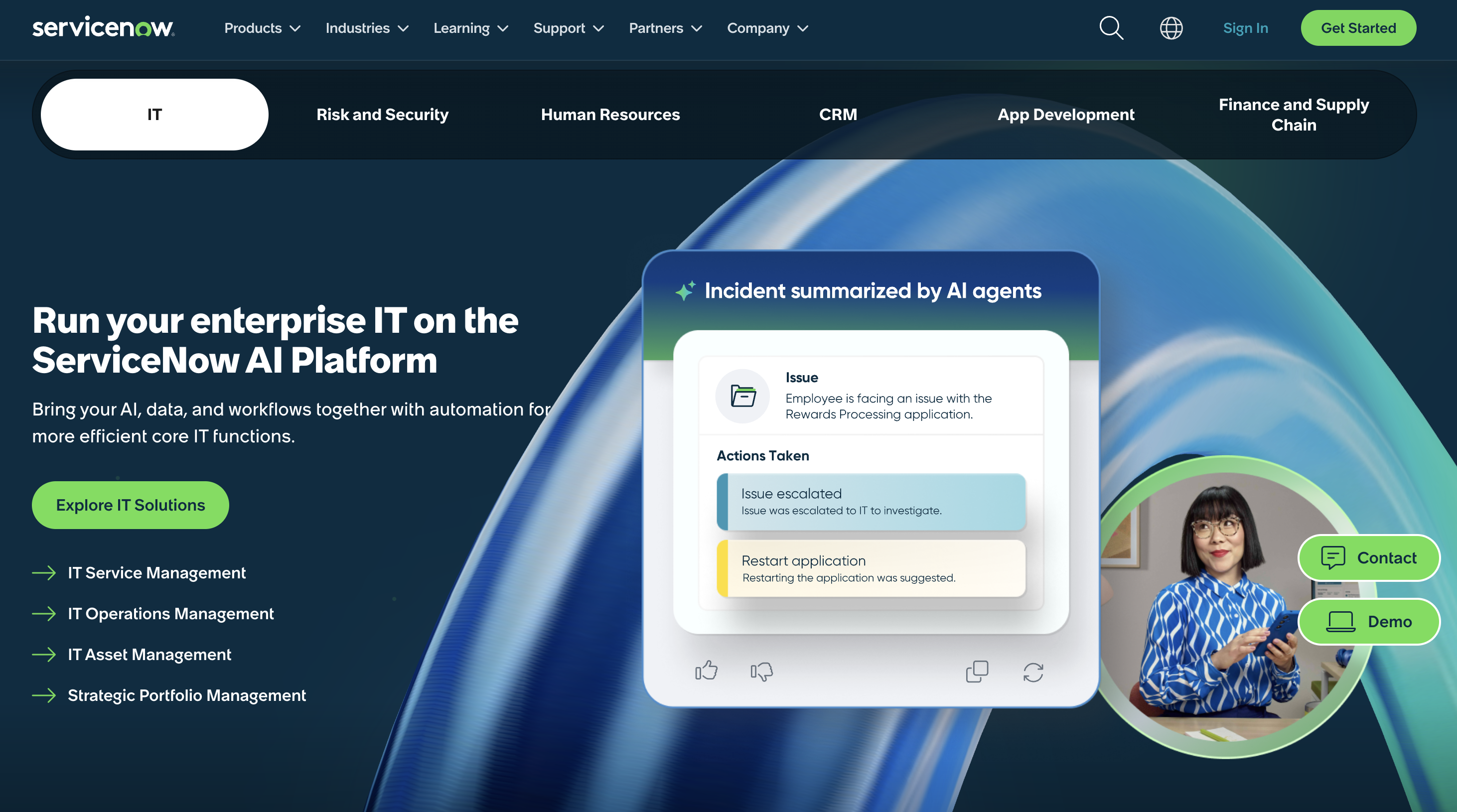
ServiceNow delivers comprehensive IT service management through a unified platform that automates workflows, predicts service issues, and integrates seamlessly with existing enterprise systems.
Key features:
- AI-powered incident management: Automatically categorizes, prioritizes, and routes tickets for faster resolution.
- Predictive intelligence: Analyzes performance data to identify trends and prevent issues before they impact users.
- Unified service portal: Mobile-friendly self-service capabilities and AI assistants for 24/7 employee support.
Pricing:
ServiceNow uses custom pricing based on your organization’s specific requirements and scale. Contact ServiceNow directly for a tailored quote that matches your company’s needs and growth stage.
Considerations:
- Platform complexity can be overwhelming for smaller organizations without dedicated ServiceNow administrators
- High implementation costs and modular pricing structure may lead to budget overruns if not carefully managed
3. Jira Service Management
By seamlessly bridging IT operations with software development workflows, Jira Service Management excels in high-velocity environments where service and development are intrinsically linked. The platform specializes in high-velocity service management, making it ideal for teams that need tight integration between their development tools and service operations. It’s trusted by over 60,000 organizations worldwide, making it a go-to choice for organizations where IT service connects closely with development teams.
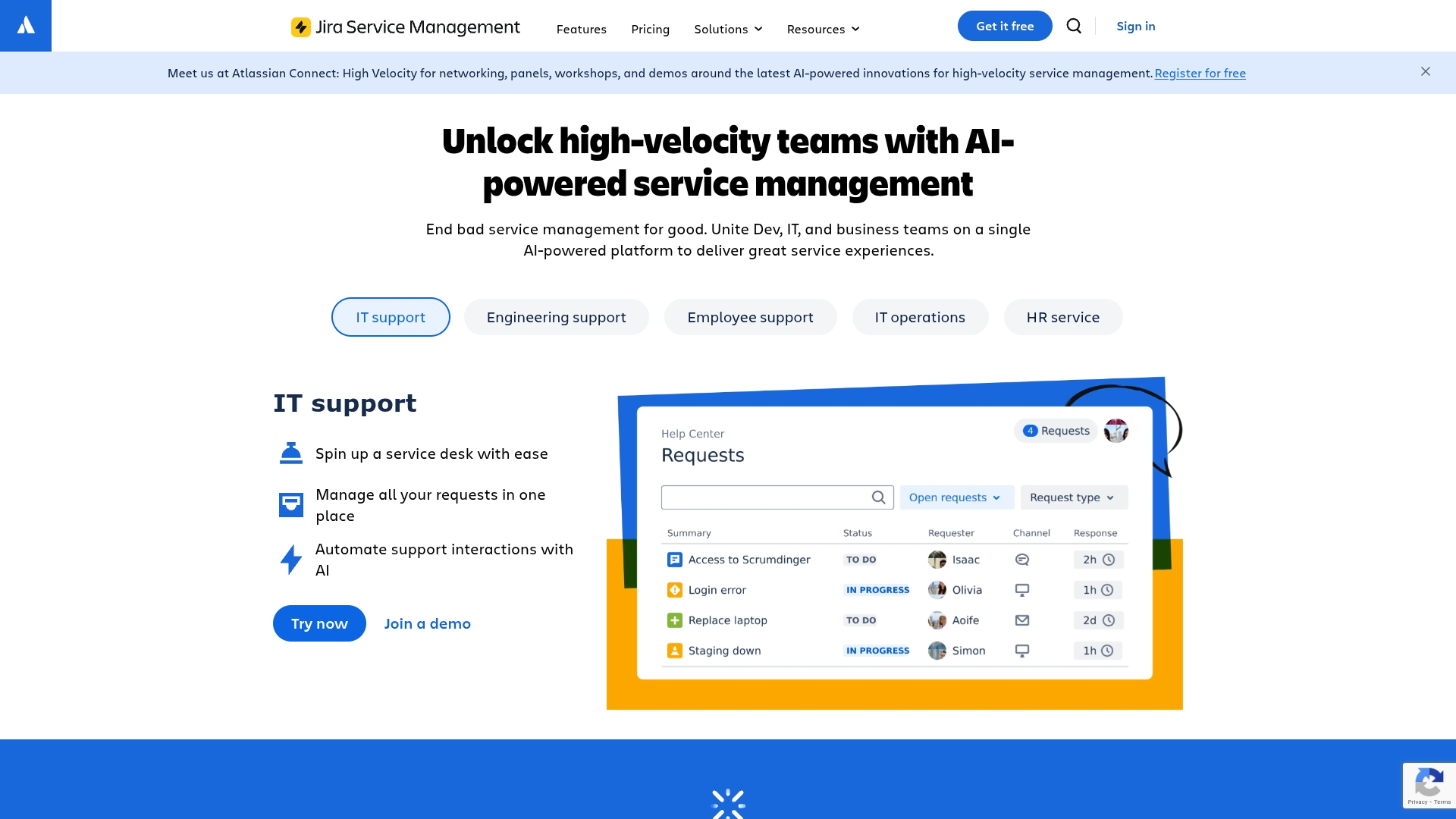
Jira Service Management delivers comprehensive ITSM and enterprise service management capabilities with native integration across the Atlassian ecosystem, enabling faster incident resolution and streamlined change management for development-centric organizations.
Key features:
- Native integration with Jira Software and Confluence for seamless collaboration between development, IT operations, and business teams
- AI-powered service capabilities through Atlassian Intelligence and Rovo for virtual agents, intelligent summaries, and enhanced search functionality
- Extensive automation with no-code/low-code rules to handle repetitive tasks and streamline workflows across incident, change, and problem management
Pricing:
- Free: $0/month for up to 10 users with 2 GB storage and basic features
- Standard: $7.53/user/month with 250 GB storage and up to 100,000 users per site
- Premium: $13.53/user/month with unlimited storage and 99.9% uptime SLA
- Enterprise: Custom pricing with 99.95% uptime SLA and advanced analytics, scale, and security features
Considerations:
- Steep learning curve for non-technical users due to extensive customization options and feature-rich interface
- The most advanced AI capabilities and robust automation rules are limited to the higher-tier Premium and Enterprise plans, potentially increasing costs for teams needing these functionalities.
4. Zendesk
Zendesk applies its renowned customer service expertise to internal IT support, creating solutions that prioritize user experience. The platform excels at unifying multi-channel support into a single workspace, making it perfect for organizations that want their internal IT teams to deliver the same service quality they expect from customer-facing teams.
Use case:
Zendesk brings customer service best practices to internal IT support, creating conversational, relationship-focused service experiences that keep employees happy and productive.
Key features:
- Omnichannel support that handles IT requests across email, chat, phone, and social media in one unified workspace
- AI-powered automation that routes tickets intelligently and provides agents with suggested responses and relevant knowledge base articles
- Self-service portal with knowledge management tools that empower employees to solve common IT issues independently
Pricing:
- Support Team: $19/month per agent (annual) or $25/month (monthly)
- Suite Team: $55/month per agent (annual) or $69/month (monthly)
- Suite Professional: $115/month per agent (annual) or $149/month (monthly)
- Suite Enterprise: $169/month per agent (annual) or $219/month (monthly)
All Suite plans include AI features with additional AI agents and advanced features available as add-ons. Automated resolutions included up to certain limits, with additional resolutions at $1.50–$2 each.
Considerations:
- Pricing can become expensive as you scale to higher-tier plans, especially for smaller IT teams with budget constraints
- While offering ITSM capabilities, it may not be as comprehensive or ITIL-compliant as dedicated platforms for organizations with complex IT processes
5. Freshservice
For mid-market organizations, Freshservice provides a comprehensive IT service management solution that balances ITIL-aligned processes with an intuitive, user-friendly interface. With Freddy AI at its core, the platform automates routine processes while providing intelligent insights that accelerate resolution times, making enterprise-grade ITSM accessible without the complexity of traditional solutions.
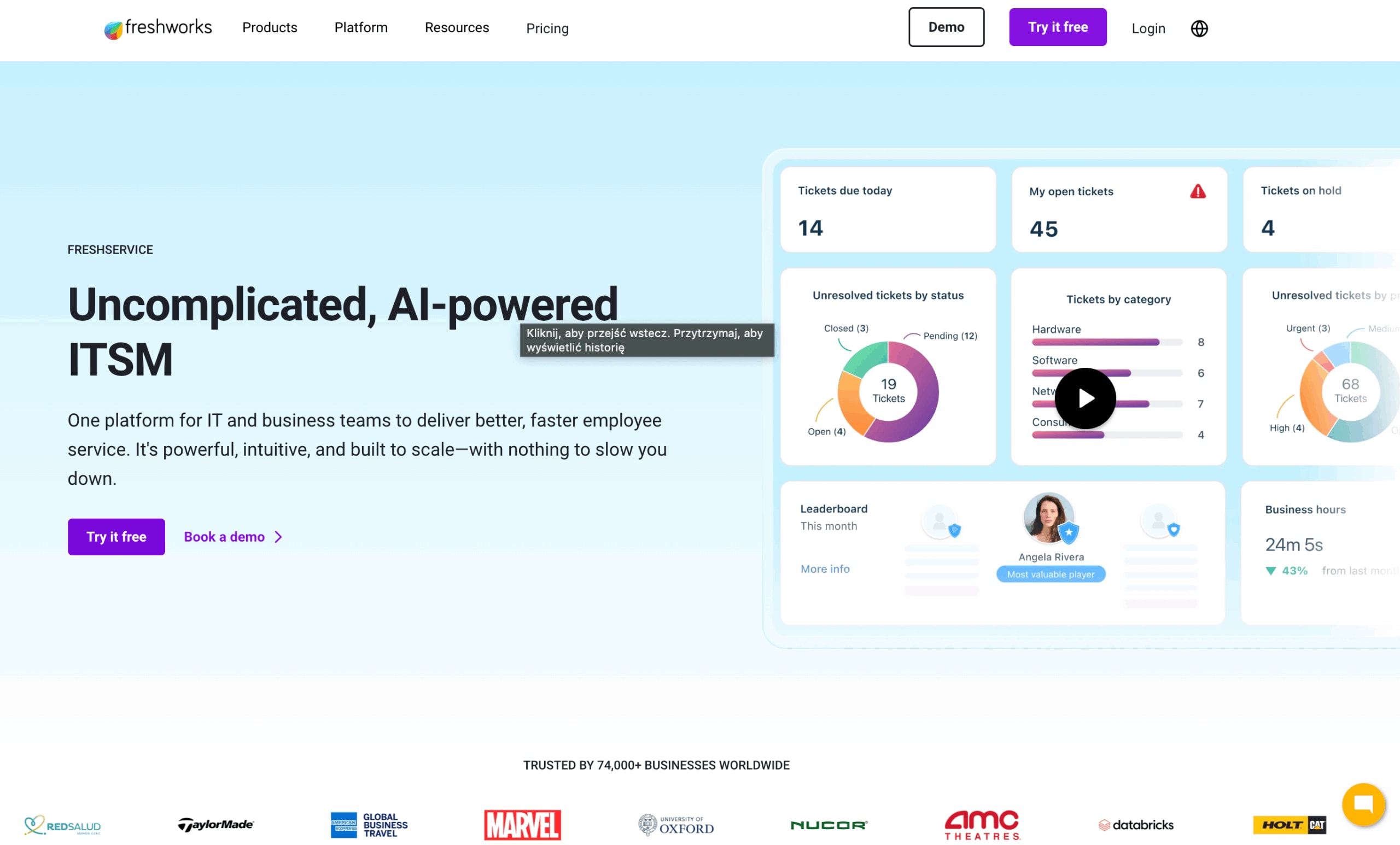
Use case:
Freshservice empowers mid-market organizations to modernize their IT operations with a unified platform that combines service desk management, asset tracking, and AI-driven automation in one easy-to-deploy solution.
Key features:
- Freddy AI provides 24/7 automated support with 53% ticket deflection rates and contextual assistance for agents
- Integrated IT asset management with auto-updating CMDB for real-time visibility across hardware and software lifecycles
- No-code workflow automation that streamlines incident management, change processes, and service requests across departments
Pricing:
- Starter: $19/month per agent (billed annually)
- Growth: $49/month per agent (billed annually)
- Pro: $95/month per agent (billed annually)
- Enterprise: $119/month per agent (billed annually)
Considerations:
- Advanced reporting and analytics capabilities may feel limited for organizations requiring deep customization and complex data visualization
- Mobile app functionality doesn’t match the full feature set of the web platform, potentially limiting field service capabilities
6. Asana
Asana approaches IT service by reframing requests as structured, collaborative projects, enhanced by AI-driven automation and cross-team coordination. The platform excels at treating service requests as initiatives rather than isolated tickets, making it perfect for organizations where IT support requires input from multiple departments and stakeholders.
Use case:
Asana provides a flexible work management platform that adapts IT service management workflows into project-based processes, centralizing requests while maintaining visibility across teams.
Key features:
- Forms and automation rules that standardize request intake and automatically assign tasks to appropriate team members
- Multiple project views (lists, boards, calendars, timelines) that visualize service request workflows from submission to resolution
- Cross-functional collaboration tools with integrations to dedicated ITSM platforms like Jira Service Management
Pricing:
- Personal: Free forever for up to 10 teammates with unlimited tasks and basic features
- Starter: $10.99/month per user (billed annually) with AI features, timeline view, and workflow builder
- Advanced: $24.99/month per user (billed annually) including goals, portfolios, and native time tracking
- Enterprise: Custom pricing with advanced security, SAML, and 24/7 support
- Enterprise+: Custom pricing with audit logs, data residency, and HIPAA compliance
50% discount available for eligible nonprofits on annual plans.
Considerations:
- Limited to one assignee per task, which can complicate collaborative service requests requiring multiple team members
- Lacks advanced ITSM features like comprehensive IT asset management and deep automation compared to specialized platforms
7. Wrike
Wrike integrates service delivery into broader organizational operations, combining enterprise-grade work management with powerful resource management AI. The platform specializes in unifying service delivery workflows with broader organizational operations, making it ideal for enterprises that need service management integrated across multiple departments and complex project structures.
Use case:
Wrike provides a comprehensive work management platform that extends service management capabilities across entire organizations, from initial service requests through billing and resource optimization.
Key features:
- Enterprise Service Management template with custom request forms, automated workflows, and cross-departmental knowledge base management
- Advanced resource management AI that handles capacity planning, workload balancing, and skill-based task assignment
- Integrated Professional Services Automation with time tracking, billing capabilities, and ERP system connections
Pricing:
- Free: $0/month (basic project management for small teams)
- Team: $10/month per user (includes Gantt charts, automations, and 2GB storage)
- Business: $25/month per user (adds resource planning, approvals, and 5GB storage)
- Enterprise: Custom pricing (includes SAML SSO, two-factor authentication, and 10GB storage)
- Pinnacle: Custom pricing (advanced reporting, budgeting, billable hours, and 15GB storage)
Considerations:
- Steep learning curve due to extensive feature set and complex interface design
- Higher pricing compared to competitors, especially for advanced features locked in enterprise tiers
Key features of successful AI service management
A reactive service operation is a liability. The goal is to build a proactive team that leverages AI to learn from every interaction, anticipate challenges, and continuously refine its strategy.
The true advantage lies in a set of core AI capabilities working in concert, making the entire service ecosystem more effective with every ticket. This approach transforms the service desk from a reactive cost center into a strategic engine for the whole organization. Here are the essential components.
- Intelligent ticket classification: AI instantly reads and understands incoming requests, routing tickets to the right person with the correct priority so critical issues are addressed immediately.
- Predictive issue resolution: Through learning from past solutions, AI helps flag recurring problems and suggests the fastest fix, shifting the focus from just solving issues to preventing them.
- Automated workflow orchestration: AI manages all the handoffs and approvals between departments, ensuring complex requests move smoothly without anyone having to chase down updates.
- Self-service optimization: Your knowledge base becomes a living document that improves on its own. AI updates articles and suggests the most helpful resources based on what actually solves problems, empowering users to find their own answers.
- Resource allocation intelligence: AI intelligently balances the workload based on team capacity and skills, preventing burnout and ensuring the right expert is assigned to the right task.
- Performance analytics: Real-time insights into team performance and service trends enable smart decisions to drive continuous improvement and identify opportunities.
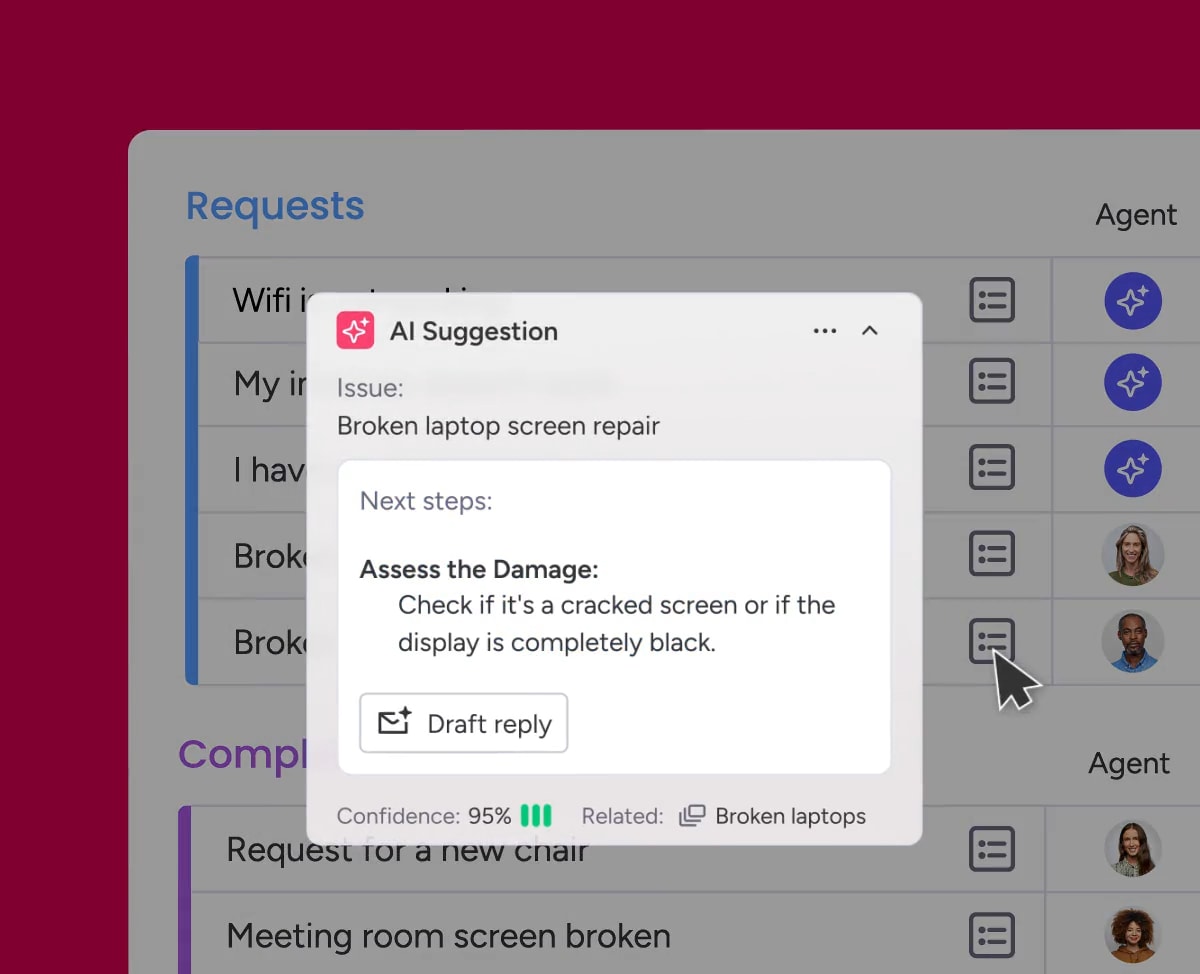
Selecting the right IT service partner
Selecting a new service platform goes beyond comparing feature lists; the objective is to find a partner whose technology integrates naturally into your team’s workflow and accelerates progress. The real win isn’t a longer list of features; it’s a platform that feels like a natural part of your team’s rhythm.
Here’s what to look for when evaluating your options:
- Growth-ready flexibility: Choose a partner that grows with you, not a rigid system that holds you back as your needs evolve.
- Strategic alignment: A great platform connects service delivery directly to the company’s strategic goals, giving everyone the full picture to make smarter decisions.
- No-code empowerment: Look for intuitive, no-code flexibility that empowers your team to build and adapt workflows on the fly, because your crew shouldn’t have to wait on developers to do their best work.
- Seamless integrations: Break down data silos with seamless integrations that connect your existing tools and systems without friction.
- Built-in AI intelligence: Tap into the power of built-in AI that learns from every interaction and helps your team work smarter.
- Real-time analytics: Get actionable insights with real-time analytics that help you spot trends and optimize performance continuously.
- Continuous innovation: Partner with a platform committed to continuous innovation, ensuring you’re always equipped with the latest capabilities.
Focus on these essentials, and suddenly, you’re not just buying software. You’re investing in a more efficient and collaborative way to work, giving your people the resources to accelerate resolution times and own their success.
Accelerate service with monday service
The right platform doesn’t just manage tickets: it transforms how your entire organization delivers service. monday service brings together AI-powered intelligence, cross-departmental workflows, and intuitive design into one unified workspace that eliminates the friction holding your team back.
What sets us apart is how naturally the platform adapts to your team’s reality. Service requests don’t exist in isolation. They trigger projects, update records, and involve multiple stakeholders. monday service connects these dots automatically, turning every resolved ticket into an opportunity to strengthen your operational foundation and build institutional knowledge.
Intelligence that scales with your team
Our AI service agent learns from your organization’s unique ticket history and knowledge base to deliver personalized solutions instantly. As your team resolves more requests, the platform gets smarter, identifying patterns and surfacing insights that help you shift from reactive support to proactive problem prevention.
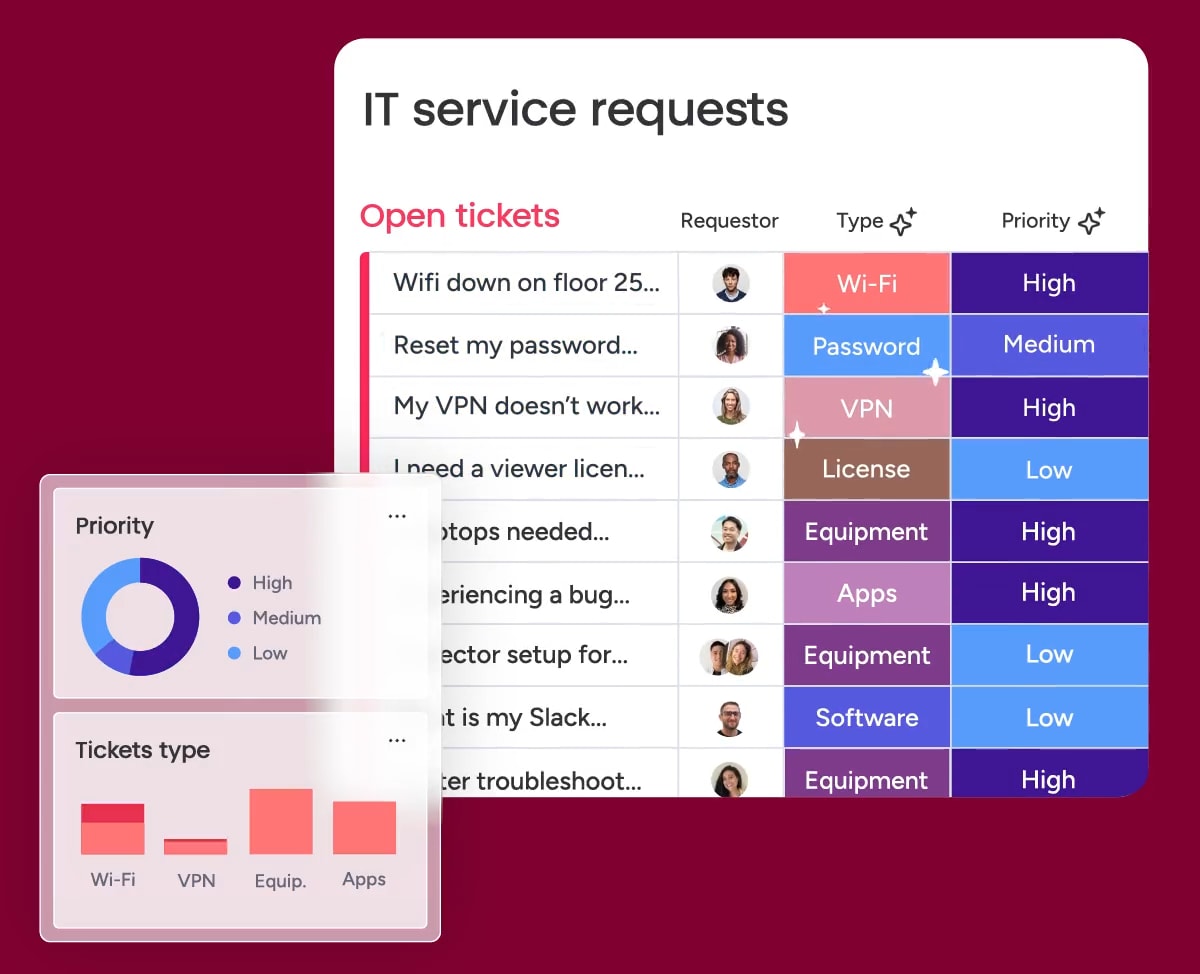
Built for how teams actually work
- Cross-platform integration: Service tickets flow seamlessly into the broader monday.com Work OS, connecting IT support with project execution, asset tracking, and strategic initiatives without platform switching.
- Executive-level insights: Real-time dashboards surface service performance trends, SLA adherence, and bottlenecks across all departments, giving leadership the visibility to make data-driven decisions.
- No-code customization: Build sophisticated automation rules and custom workflows with drag-and-drop simplicity; no technical expertise required to create intelligent routing, automated approvals, and multi-step processes.
- Department-wide scalability: Extend beyond IT to HR, facilities, and any team that handles service requests, creating a consistent experience while maintaining each department’s unique workflows.
monday service gives your team the power to deliver enterprise-grade service with the simplicity of a tool they’ll actually want to use every day.
Try monday service